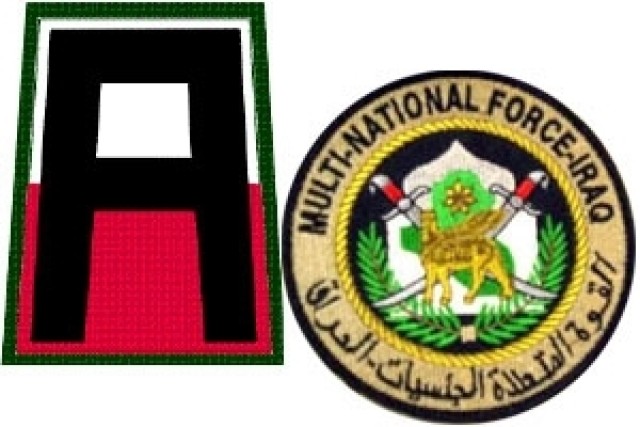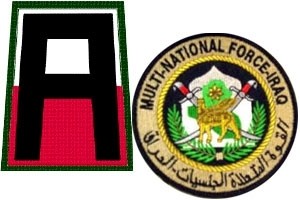When Command Sgt. Maj. Marvin Hill became First Army's top NCO in 2005, he succeeded Jeffrey J. Mellinger, who had become the senior enlisted adviser for Multi-National Force - Iraq.
Now, as Hill prepares for deployment in Iraq, First Army's top NCO will again become the senior enlisted adviser of MNF-Iraq, which is divided into six major areas of responsibility maintained by forces from 26 countries.
"The fact that two First Army command sergeants major in a row have left this command to take over the top NCO position for our military's top priority mission in Iraq speaks very highly of the quality of leadership this command has enjoyed for the past several years," said Lt. Col. Richard Steele, First Army's public affairs chief.
Both command sergeants major helped ensure that First Army consistently trains its Soldiers like they will fight, Steele said.
"Their extremely high standards live on as First Army continues to prepare our nation's sons and daughters for war," he said. "The only mission more important than that is the actual conduct of the war on the ground in theater, and we are very proud of and grateful to Command Sgt. Maj. Mellinger and Command Sgt. Maj. Hill for doing both."
Deploying to Iraq, and even working with Gen. David Petraeus is not new for Hill, a Memphis, Tenn., native. He served as Petraeus' senior enlisted adviser as the 101st Airborne Division command sergeant major at Fort Campbell, Ky. From 2003-2004, Hill was deployed in northern Iraq, along with more than 20,000 Screaming Eagles of the 101st. The unit liberated the holy city of Najaf and its sister city Kufa in the first significant combat action in Iraq.
Petraeus, the MNF-Iraq commander, said he welcomes the reunion.
"Marvin Hill was an awesome division CSM in combat -- as well as back home," said Petraeus in an e-mail message from Iraq. "I cannot imagine a better air assault buddy. He was a tremendous wingman, a CSM who was also out with our troopers, sharing hardship and risk with them, and providing them a terrific example and lots of energy.
"He was one of those great senior NCOs, in fact, who makes things happen. And he did that repeatedly as the 101st Airborne Division's CSM during the fight to Baghdad and our subsequent stability operations in northern Iraq. He'll be a tremendous MNF-I CSM!"
During a speech at his change of command ceremony in February, Petraeus acknowledged that the situation in Iraq is exceedingly challenging, that the stakes are high.
"Our job in the months ahead, supporting and working with Iraqi forces, will be to improve security so that the Iraqi government can resolve the tough issues it faces and so that the economy and basic services can be improved," he said in February. "These tasks are achievable. This mission is doable."
Hill says that his work at First Army helped prepare him to be the MNF-Iraq command sergeant major.
"The First Army CSM position is a unique position in that it exposed me to many unfamiliar areas of Army Operations and procedures, in particular when it comes to our National Guard and Army Reserve forces," he said. "It rounded me out as a Soldier and senior leader. I am sure that my predecessor can attest to the same."
As First Army's command sergeant major, Hill said that one of his major challenges has been getting the rest of the Army to understand the importance of First Army's mission of providing proficiency training to deploying Soldiers and units to ensure they are prepared for combat.
"Command Sgt. Maj. Hill's first thought is taking care of Soldiers," said Lt. Gen. Russel HonorAfA, First Army commander and Hill's boss since 2005. "He will be seeing the fruits of his labors when he visits Reserve Component troops in Iraq that were trained by First Army."
During his tenure as First Army command sergeant major, Hill developed a relationship with state sergeants major and governing officials and helped bridge the transition of the Army National Guard and Reserves from a strategic reserve to an operational force. He also oversaw the mobilization, training and deployment of more than 108,000 Soldiers in 8,200 units, with the movement of more than 50,000 vehicles and pieces of equipment in support of the war on terrorism.
Hill said he anticipates that his biggest challenge in his new position will be spreading himself thin enough to make immediate and lasting impact on the entire force, whether Army, Marines, Air Force, Navy, coalition or contractors. And, he said, he looks forward to maintaining the style of leadership that has become his legacy: on the ground, where the troops are.
"Command Sgt. Maj. Hill has been chosen to lead Soldiers in the most dynamic environment today and would rather be a player instead of an observer," said HonorAfA. "He has made a true difference at First Army and will always be part of our family. We will miss him, but our Soldiers need him in Iraq."


Social Sharing